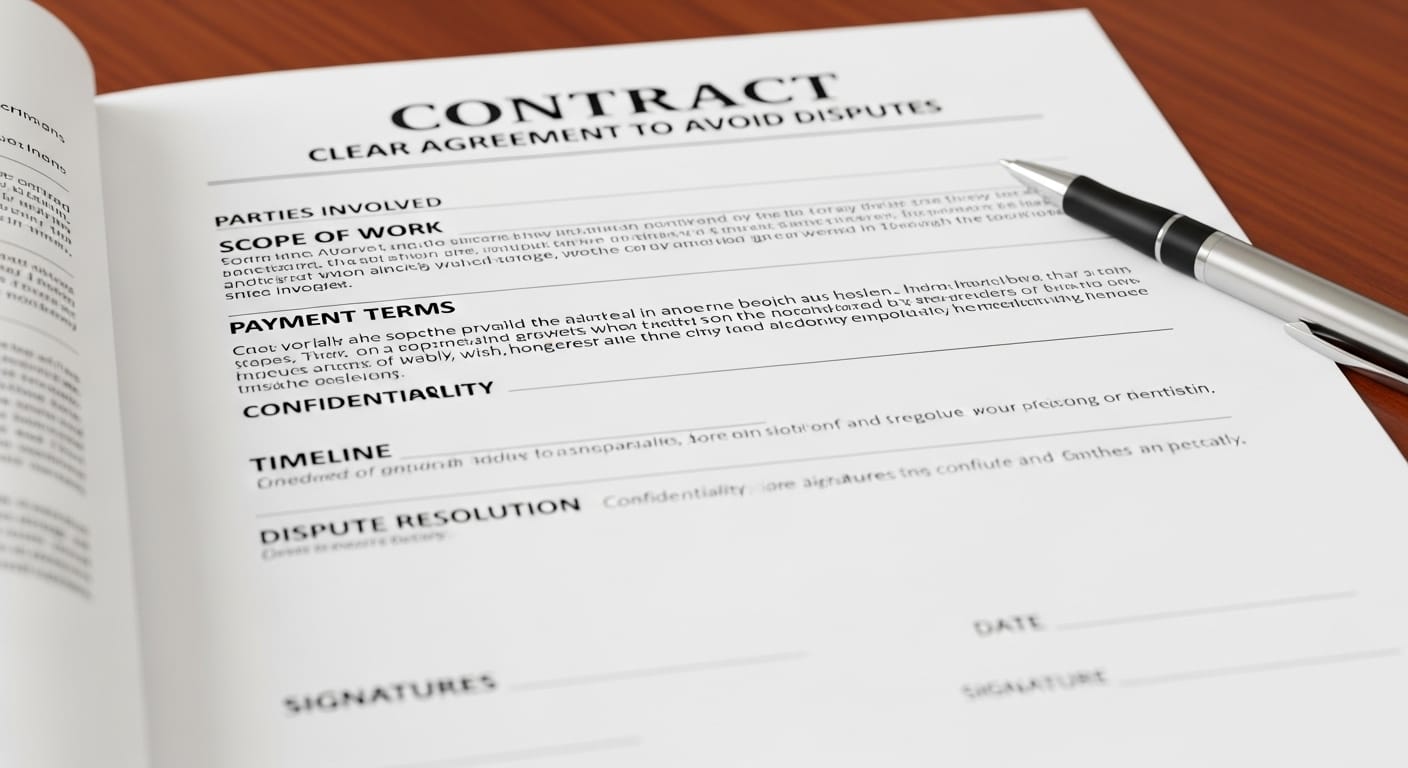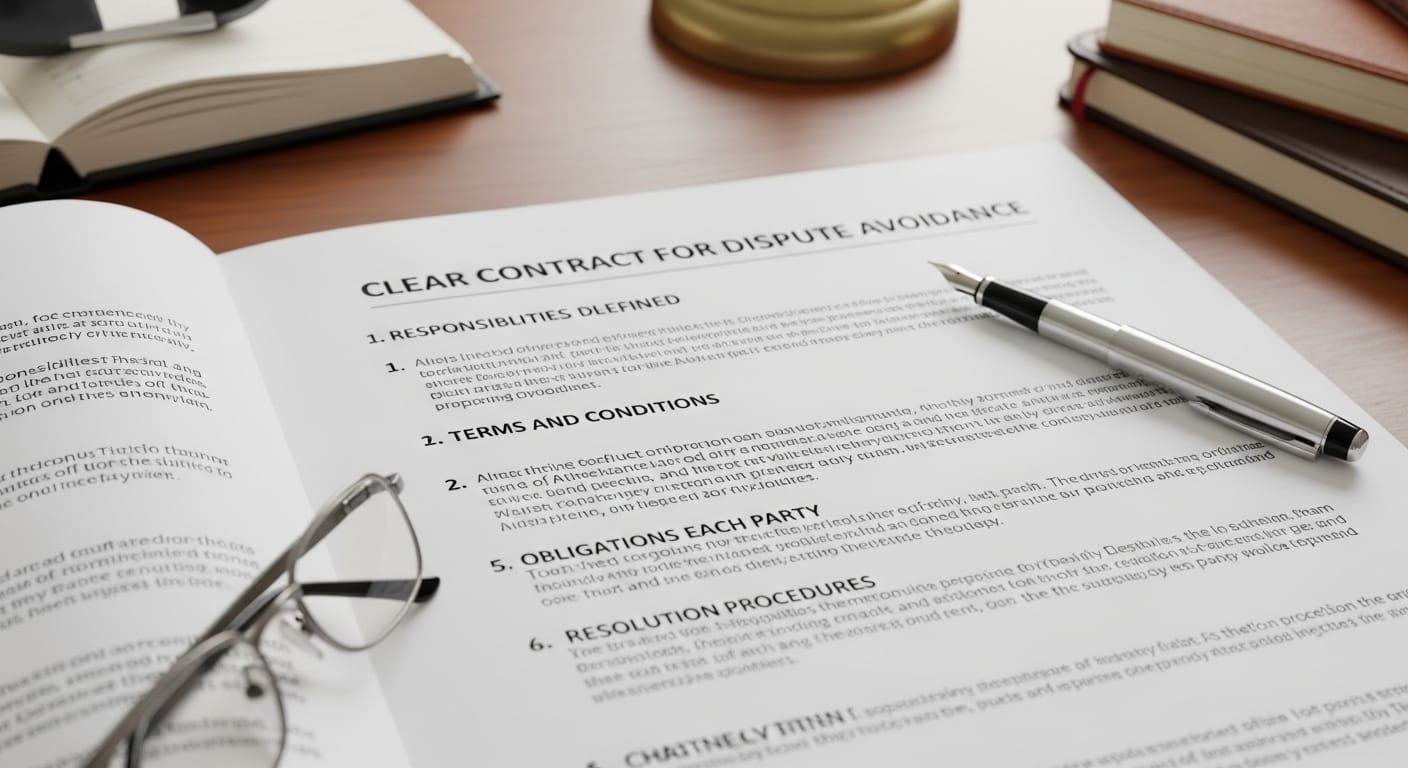Contracts are the unsung heroes of the modern world. They’re the glue that holds together everything from massive corporate mergers to agreements about who’s bringing the potato salad to the family picnic.
But let’s be real: contracts can be confusing. A poorly written one is like a bad map—it might get you somewhere, but it’s probably not where you want to go. Worse, it could lead to disputes, lawsuits, and a lot of regret about not hiring a lawyer.
So, how do you draft a contract that’s as clear as grandma’s chicken soup? Let’s dive into the essentials of creating a solid, easy-to-understand agreement that keeps everyone on the same page and out of court.

Top Takeaways and Key Concepts
Include All Essentials: Clearly state who, what, when, where, and how much in every contract.
Define Terms Precisely: Avoid vague words like “ASAP” or “reasonable”; use specific deadlines and measurable outcomes.
Use Plain Language: Write in clear, simple terms while explaining any necessary legal jargon.
Add Dispute Resolution: Include mediation, arbitration, or court procedures to handle conflicts efficiently.
Plan for Contingencies: Address unforeseen events and breaches with clauses like force majeure and penalties.
Summary of This Article
Please Note: This post may contain affiliate links. If you click one of them, we may receive a commission at no extra cost to you. As an Amazon Associate, I earn from qualifying purchases.
The article emphasizes how to draft clear, enforceable contracts that minimize misunderstandings and legal disputes. It advises including all essential details, defining terms precisely, using plain language, and incorporating dispute resolution methods. Planning for unforeseen events with clauses like force majeure and documenting everything in writing is crucial. Thorough review, ideally by a lawyer, ensures both parties understand and agree to all terms, saving time, money, and stress in the long run.
1. Start with the Basics: Who, What, When, Where, and How Much

Every good contract answers the essential questions: Who is involved? What are they agreeing to do? When does it need to happen? Where is it going down? And, of course, how much money is changing hands? These are the building blocks of any clear agreement.
For example, if you’re hiring someone to paint your house, don’t just write, “Joe will paint the house.” Specify which house, what color, and whether Joe is responsible for cleaning up after himself. (Trust me, you don’t want to be the one scraping paint off the neighbor’s cat.)
The more details you include, the better. It’s like building a Lego set—leave out a piece, and suddenly your Millennium Falcon looks more like a spaceship from *Wall-E*. By the way, if something seems too obvious to include, put it in anyway. Assumptions are the enemy of good contracts.
2. Define the Terms (Because “ASAP” Means Different Things to Different People)
One of the easiest ways to end up in a contract dispute is to leave terms open to interpretation. Words like “reasonable,” “soon,” or “acceptable” might sound good in theory, but they’re legal landmines in practice.
For instance, if you write, “The project will be completed ASAP,” what does that actually mean? To you, it might mean tomorrow. To the other party, it might mean “sometime after my two-week vacation and a Netflix binge.”
Instead, set specific deadlines and measurable outcomes. For example: “The project will be completed by March 15, 2024, and will include three coats of paint in Benjamin Moore’s ‘Mountain Air.’” Not only does this leave less room for argument, but it also ensures everyone knows what they’re signing up for.
3. Use Simple Language: Leave the Legalese to Shakespeare
If your contract reads like it was written by a 17th-century playwright, congratulations—you’ve confused everyone. Terms like “heretofore,” “therewith,” and “the party of the first part” aren’t just outdated; they’re practically begging for misinterpretation.
Instead, write in plain, straightforward language. Think of it like this: if a fifth-grader can’t understand it, rewrite it. You don’t have to dumb it down, but there’s no need to turn it into a riddle, either.
By the way, this doesn’t mean you should skip legal terms altogether. Words like “indemnify” and “force majeure” have specific meanings that can be important. Just make sure to explain them clearly or include a glossary if needed. Nobody wants to Google their own contract.
4. Include a Dispute Resolution Clause (Because Stuff Happens)
No matter how airtight your contract is, disputes can still happen. Maybe someone forgets a deadline, or maybe there’s a misunderstanding about the terms. That’s why every contract should include a plan for handling disputes before they spiral into lawsuits and late-night stress-eating sessions.
For starters, decide whether disputes will be resolved through mediation, arbitration, or traditional court proceedings. Mediation is often less formal and cheaper, but it requires both parties to play nice. Arbitration is more structured and legally binding, but it can be expensive. And court… well, let’s just say it’s the nuclear option.
Spell out the process clearly. For example, “Any disputes will first be submitted to mediation within 30 days of written notice. If mediation fails, the dispute will proceed to arbitration.” Having this in writing can save you time, money, and a lot of yelling.
5. Plan for the “What Ifs” (Because Murphy’s Law Is Real)
Life is unpredictable, and your contract should account for that. What happens if one party can’t fulfill their obligations due to circumstances beyond their control? (Hello, global pandemics.) What if materials cost more than expected, or someone decides to ghost the project altogether?
This is where clauses like “force majeure” (aka “act of God”) come into play. These clauses protect both parties if something completely unforeseen prevents the contract from being carried out.
On the other hand, you’ll also want to include penalties for avoidable breaches. For example: “If Party B fails to deliver materials by April 1, Party B agrees to pay a 10% penalty.”
Planning for the unexpected doesn’t mean you’re pessimistic—it just means you’re smart.
6. Get Everything in Writing (Because Verbal Agreements Are a Trap)
I don’t care how trustworthy the other party seems. If it’s not in writing, it might as well not exist. Verbal agreements are legally enforceable in some cases, but proving what was said is about as easy as herding cats during a thunderstorm.
Put every detail in the contract, from deadlines to payment schedules. And don’t forget to include signatures from both parties. A handshake might feel old-school charming, but a signature is what actually holds up in court.
By the way, if there are any changes to the agreement later, update the contract in writing. Avoid the “Oh, we agreed to that verbally” disaster at all costs.
7. Review It (and Then Review It Again)
Once you’ve written the contract, don’t just shove it in front of the other party and say, “Sign here.” Take the time to review it thoroughly. Better yet, have a lawyer look it over. They can catch things you might have missed, like a sneaky clause that could cause problems later.
Also, make sure the other party understands the terms. A contract isn’t about tricking someone into agreeing to something they don’t fully grasp—it’s about creating a mutual understanding. (Yes, even if it’s tempting to include that “free pizza every Friday” clause just to see if they notice.)
Conclusion: A Little Effort Now Saves a Lot of Headaches Later
Drafting a clear contract might not be the most exciting thing you’ll do this week, but trust me, it’s worth it. The more effort you put into getting it right upfront, the less likely you are to end up in a messy, expensive dispute later. Think of it as an investment in peace of mind—and fewer calls to your lawyer.
Suggested Resources:
– How to Write a Contract That’s Legally Binding
https://www.nolo.com/write-a-legally-binding-contract
– The Importance of Clear Contract Terms
https://www.upcounsel.com/contract-terms-guide
– Common Mistakes to Avoid in Contracts
https://www.lawdepot.com/contract-mistakes
Frequently Asked Questions
What are the essential elements of a clear contract?
A clear contract should specify who is involved, what is being agreed upon, when and where actions occur, and how much compensation is involved. These details prevent ambiguity and disputes.
Why is defining terms in a contract important?
Defining terms eliminates misunderstandings caused by vague language. Specific deadlines and measurable standards ensure all parties share the same expectations.
Should contracts use legal jargon or plain language?
Contracts should use plain, easy-to-understand language. Legal terms can be included if clearly explained, helping all parties comprehend their obligations.
What is a dispute resolution clause and why include it?
A dispute resolution clause outlines how conflicts will be handled, such as through mediation, arbitration, or court. Including it saves time, stress, and legal costs.
How do contracts handle unforeseen events or breaches?
Contracts often include clauses for unforeseen events, like force majeure, and penalties for breaches. These protect both parties and clarify responsibilities when unexpected issues arise.
Why should all agreements be put in writing?
Written contracts serve as proof of agreed terms and prevent disputes. Verbal agreements are difficult to verify, making written documentation crucial for legal enforceability.
Is it necessary to have a lawyer review a contract?
Yes, legal review helps identify potential issues or unclear clauses. A lawyer ensures the contract protects your interests and complies with relevant laws.

Kevin Collier is a legal expert passionate about simplifying complex legal concepts for everyday individuals. With a focus on providing clear, practical information, he covers a wide range of topics, including rights, responsibilities, and legal procedures. Kevin aims to empower readers with the knowledge they need to navigate the legal landscape confidently, ensuring they can make informed decisions regarding their legal matters. Through insightful articles and easy-to-understand resources, he helps demystify the law, making it accessible to all.










